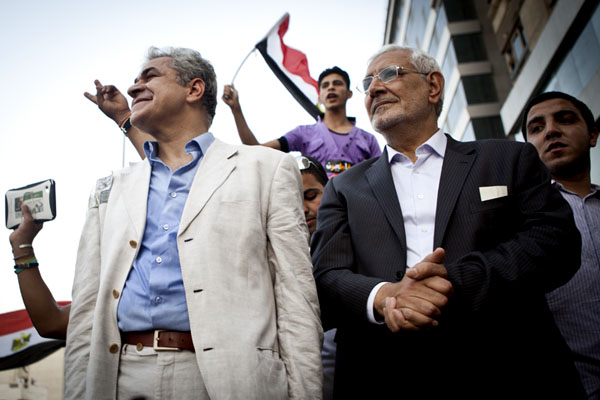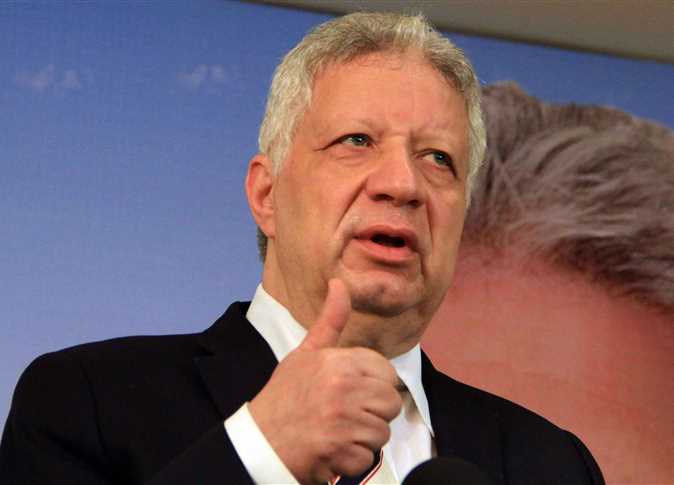
Immediately after Mohamed Morsy's victory in the presidential race, several political figures and forces declared their intention to contest the upcoming parliamentary elections, in a move seen by many as a sign of fierce competition among emerging and ambitious politicians.
Challengers from both Islamist and secularist backgrounds have thrown their hats into the ring.
Former presidential hopeful Abdel Moneim Abouel Fotouh, who came fourth in the race with four million votes, declared the establishment of the Strong Egypt Party under the same platform he developed in the presidential elections. The former Brotherhood member said his platform was intended to fall outside the polarizing dichotomy offered by Islamist and secular parties.
Meanwhile, Salafi sheikh Hazem Salah Abu Ismail, who was excluded from the presidential race on legal grounds, has announced the establishment of the Egyptian Umma Party. The Arabic word umma refers to the Muslim community.
On the secular side, there is the Third Current, a coalition that includes liberal and leftist political parties. The founding members said they aim to challenge the face-off between what they called a religious state headed by the Brotherhood and a military state represented by the remnants of the old regime.
The parties joining the coalition range from the most liberal, such as the Constitution Party and the Free Egyptians Party, to the center-left, represented by the Egyptian Social Democratic Party. On the coalition's notional left wing are the Tagammu Party and the Popular Alliance Socialist Party
"This represents a complete fragmentation of the political scene," argued Zeinab Abul Magd, a professor of history in the American University in Cairo.
"We are paying the price for the political immaturity of famous political figures whose egos do not allow them to compromise for the sake of the country," she said, blaming the political elite for lacking the vision to form strong political organizations.
"Why is Abouel Fotouh not joining [Mohamed] ElBaradei, why is Hamdeen [Sabbahi] is not joining Abouel Fotouh? Because everyone is trying to be the star. Everyone wants to establish something of his own to fulfill his ego," she said.
The Third Current: a real alternative?
"We do not want to set ourselves against any strong political party or current," wrote liberal politician and founding member of the Egypt Freedom Party Amr Hamzawy in an op-ed published in Al-Watan daily. Hamzawy argued that the new current must define itself on its own terms, without compromising national interests.
Hamzawy, who dismissed accusations that political polarization was deepening, said he would prefer that the Brotherhood refrain from forming a coalition government as Morsy had promised. Better, he argued, that the Third Current be an opposition to evaluate the performance of the Islamist government.
The former liberal MP also argued that Egypt "desperately needs" a political current that can democratically compete with the Islamists.
The coalition is also led by the campaign of former presidential candidate Hamdeen Sabbahi, who unexpectedly came third in the presidential race with almost five million votes, defying the opinion polls.
Sabbahi paved the way for the Third Current when he openly called for boycotting the elections in the run-off between Morsy and former Mubarak affiliate Ahmed Shafiq, deeming the race between Islamists and the ousted regime "a fight to which Egyptians do not belong," according to state run news agency MENA.
He described his vision for the current as a movement "with development, economic and social tools, with a popular base so it can participate in local council, parliamentary and presidential elections."
But others believe that any such current will be too incoherent to act effectively.
Khalil al-Anani, an analyst of Egyptian politics at Britain's Durham University, sees the Third Current as a reincarnation of the Egyptian Bloc, a coalition formed by the liberal Free Egyptians Party, the Social Democratic Party and the leftist Tagammu Party, which won only nine percent of the total seats in the dissolved Parliament.
"I don't think the so-called Third Current is a genuine attempt to create a counterweight to the Islamists. It's just a combination of desperate and apathetic parties and politicians who cannot compete with Islamists in the political arena. They are already divided politically and ideologically," he argued.
However, founding members of the Third Current say they are working on electing a high board and a general assembly for political and electoral coordination.
Magda Fathy, a member of the Popular Alliance Socialist Party, acknowledged ideological conflict as a problem facing the Third Current, yet argued that preserving the "civil nature of the state" is the most important consideration, and one which unifies them. The Arabic word for 'civil', madani, can imply 'secular', 'civilian' or both.
"This current is united over the civil state, but more deeper coalitions will be united over the ideas of social justice, including socialist parties like ours — Karama and the Egyptian Social Democratic Party," she said.
Fathy sees the Third Current as a continuation of the Revolution Continues Alliance, a coalition of leftist political parties that contested the last parliamentary elections. But the coalition only secured seven seats in the Parliament, and some remain sceptical of their seriousness.
"The liberals do not want to go out in the streets in the heat; they do not want to stain their shoes with the mud of Egypt's streets. They do not want to work on the streets and build real political calibers across the country like the Islamists," Abul Magd argued.
New Islamist forces: Between reshaping political Islam and personification
Anani said Abouel Fotouh represents a 'post-Islamist' current which, he says, may well register as an important force in the years to come.
Yet it is unclear whether Abouel Fotouh, who was expelled by the Brotherhood after he declared his intention to run for the presidency last year, will be able to challenge the group's huge electoral machine.
“We are not aiming to challenge anyone — we are against political polarization at the first place. Our platform is a national effort to include all sectors of Egyptian society,” claimed Ahmed Abdel Gawwad, a political advisor to Abouel Fotouh.
He said that Strong Egypt is not an Islamist party, but is inspired by a broad and civilized understanding of the Islamic Sharia.
"Some may see our political party as leftist due to our strong support for social justice, while others may consider us liberal due to our values of preserving civil and personal liberties," he argued.
"It's about how every current will try to position itself, we are going to coordinate with other new political parties that share our values and concerns, but our position is not conflicting with anyone and does not deepen polarization," he said.
One figure who is afraid of neither conflict nor polarization is Abu Ismail.
"Abu Ismail is clear when it comes to Sharia and politics. The Brotherhood is a pragmatic and reformist force that is attempting to appease the military and the secular forces at the expense of Sharia and the revolution," Salafi historian and Abu Ismail supporter Mohamed ElHamy told Egypt Independent.
The crucial alternative Abu Ismail provides, Hamy argued, is the clear and revolutionary spirit that other Islamist currents lack. For him, although the Salafi Nour Party may be stricter when it comes to Sharia than the Brotherhood, they still fail to challenge the military.
On economic policy, Hamy seems to favour a laissez-faire approach. "Abu Ismail pushes for more institutionalization and decentralization. It is not the job of the president to spend the yearly bonuses of government workers. His job is to provide the institutional framework to raise the standards of living," he said.
Anani agreed with Hamy that Abu Ismail represents a tide of "revolutionary Salafism".
Yet, like Abouel Fotouh's project, it remains strongly anchored in a single charismatic personality. Anani argued that both projects need to be less connected to the charisma of each man, and become more "institutionalized."
Hamy disagreed. "Who said it is only the person? It's all about the idea. Abu Ismail was not known before declaring his intension to run for presidency. It is his idea that flourished," he said.
Abdel Gawwad also dismissed Anani's claim, asserting that Abouel Fotouh's decisions and ideas were the product of a team effort.
"Abouel Fotouh will be the representative of the founding members, but it is not decided yet if he will be the head of the party or not. All the party's leadership is from the youth whom Abouel Fotouh supported since day one in his presidential bid," he said.




